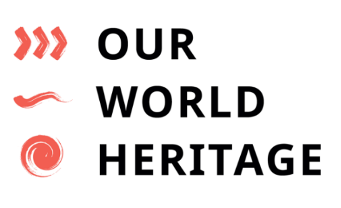PRESS RELEASE: A new initiative by citizens of more than 50 countries launched yesterday. It began with a live online event featuring a discussion on the challenges facing our shared heritage with political and professional leaders. Moderated by the international journalist Zeinab Badawi from London, details were available on their website and streamed live on Facebook and YouTube.
This open initiative is being launched by concerned citizens from across the globe, bringing a rich diversity of cultures, ages, genders, background and expertise to bear on the challenges our heritage is facing. Created to guarantee the conservation/protection of the World’s Heritage by increasing of the role of civil society, the initiative welcomes all who believe that in our rapidly changing world there is an urgent need to preserve all heritage, at international, national and local levels.
The UNESCO World Heritage Convention is an important international treaty that has for almost 50 years played a major role in expanding heritage legislation worldwide and identifying and promoting the protection of a growing list of the World’s most unique sites – both cultural and natural.
Sadly, today however, this instrument risks to collapse under its own success: with 1,121 listed sites, the crucial “protection and conservation” outlined in the treaty[1] has taken second place to list-making, and properties are increasingly threatened as politics and bargaining between States overrides protection. In simple terms corporations and governments often ignore the necessity to safeguard our World Heritage for the future, instead prioritizing immediate profit over long term values and the need to preserve our shared past.
Cases of failure to protect great heritage sites are common, ranging from Venice, where the issue of the large ships in the lagoon has yet to be resolved, to Vienna, where high-rise construction is spoiling the urban landscape, to the Selous National Park in Tanzania, endangered by the construction of a major dam, or Machu Picchu, where a new airport under construction will destroy the sacred landscape of the site.
When World Heritage was created in 1972, it was the expression of a collective vision for the protection of the masterpieces of human genius and of the marvels of nature.2 But as the Convention approaches its 50thanniversary in 2022, safeguarding has become a secondary concern as many sites have lost or are about to lose their value due to extractive industries, the impact of tourism and for short-term financial development gains.
Today unfortunately, democratic and inclusive mechanisms that can help in monitoring and preventing damage to properties barely exist. The public – from local communities to international organizations – are seldom aware of how their States vote and behave at sessions of the international World Heritage Committee[2] and often have very limited information on a site’s true state of conservation. “These human-made threats are on the top of others nearly non-manageable threats that come from natural disasters, climate change and military conflicts and wars,” said Sibongile Masuku, from Sol Plaatje University (Heritage Studies, Northern Cape, South Africa), one of the initiative’s founders. “Only NGO’s and communities’ efforts can foster and force movement towards solutions”.
OUR WORLD HERITAGE seeks to counter this destructive trend and renew the original spirit and mission of the World Heritage Convention, by engaging citizens, civil society groups and professional and academic organizations. The initiative aims to fill the void with new information gathering and monitoring tools open to the public. During 2021 solutions and tools will be developed in a series of monthly online activities open to all, aimed at debating the critical issues facing heritage conservation today and shaping practical proposals to adapt the World Heritage system to the needs of the 21st-century.
Founded with the premise that “Our cultural and natural heritage (continue to be) increasingly threatened with destruction not only by the traditional causes of decay, but also by changing social and economic conditions which aggravate the situation with even more formidable phenomena of damage or destruction” this new initiative is being founded and launched today by heritage leaders and concerned citizens from across the world. Its secretariat is based in The Netherlands and its governing board is global in representation.
“OURWORLDHERITAGE is ready to cooperate with all international and national NGOs operating in the field of cultural and natural heritage protection to strengthen its ability to promote change in the implementation of the World Heritage Convention,” stated Francesco Bandarin, Former Director of the UNESCO World Heritage Centre, another of the initiative’s founders.
A major global event and conference on the future of the world’s heritage will be organized in April 2022, on the occasion of the 50th anniversary of the UNESCO World Heritage Convention.
[1] https://whc.unesco.org/en/conventiontext/
[2] “… that deterioration or disappearance of any item of the cultural or natural heritage constitutes a harmful impoverishment of the heritage of all the nations of the world” – Preamble of the World Heritage Convention
You can watch the launch event HERE on YouTube.
Sign Up for the Our World Heritage Newsletter HERE
Visit their website HERE
You can read more here:
The Art Newspaper: New heritage body aims to keep UNESCO in check 16.11.20
